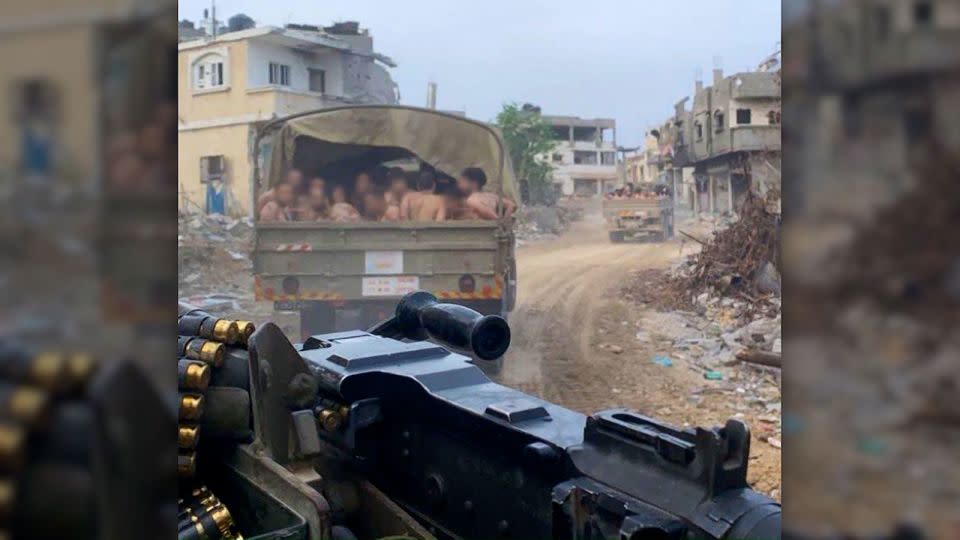Images from Gaza show Israeli soldiers detaining dozens of men stripped to underwear
Images from Gaza circulating on social media Thursday showed a mass detention by the Israeli military of men who were made to strip to their underwear, kneel on the street, wear blindfolds, and pack into the cargo bed of a military vehicle.
The exact circumstances and dates of the detentions are unclear, but some of the detainees’ identities were confirmed by colleagues or family members.
Both the Israel Defense Forces (IDF) and Hamas responded Friday to the images.
IDF spokesperson Jonathan Conricus told CNN the men pictured were “Hamas members and suspect Hamas members.” He said they were “without clothes in order to make sure they’re not carrying explosives.”
Izzat al-Rishq, a member of Hamas’ political office, accused Israel in a statement of “kidnapping, invasive searches and disrobing” what he said was “a group of displaced Palestinian civilians.” He called it a “reprehensible crime” and urged human rights organizations to intervene.
At least some of the men are civilians with no known affiliation to militant groups, according to a CNN interview with one of their relatives and a statement by one of their employers, a news network.
The Euro-Mediterranean Human Rights Monitor posted an image of one detainment and said in a statement on its website Thursday that “the Israeli army detained and severely abused dozens of Palestinian civilians.”
“Euro-Med Monitor received reports that Israeli forces launched random and arbitrary arrest campaigns against displaced people, including doctors, academics, journalists, and elderly men,” it said.
CNN has geo-located some of the images to Beit Lahia, north of Gaza City.
The Israeli media, without indicating a source, has portrayed the images as the surrender of Hamas members. A journalist asked IDF spokesperson Rear Admiral Daniel Hagari about the images during a news conference on Thursday, saying, “We’ve seen images of many captives, Hamas terrorists, that the IDF arrested during the ground maneuvering.”
Hagari said that, in fighting Hamas, “those left in the area gradually come out.”
“We investigate and check who has ties to Hamas, and who does not,” he said. “We arrest them all and question them. We will continue dismantling each one of those strongholds until we are done.”
On Friday, Israeli government spokesperson Eylon Levy told CNN that men depicted in images of mass detentions in Gaza were all “suspected terrorists.”
Israeli forces were apprehending military-age men in areas of Gaza where they had been urging evacuation for more than a month, according to Levy, describing these areas as “Hamas strongholds.” Those who were not terrorists would be released, he said.

In an interview with CNN on Friday, Hani Almadhoun, director of philanthropy for the US arm of the United Nations Relief and Works Agency for Palestine Refugees in the Near East (UNRWA USA) said he knew a dozen people pictured in circulating images, including his brother.
“They’re neither fighters, they’re not surrendering, they’re just civilians who were there with their families trying to survive this,” Almadhoun told CNN’s Pamela Brown.
Almadhoun said the men he knew from his family had since been released, but described the situation as “baffling” to see his brother, a father and a shopkeeper, “dragged” from his home as a suspected Hamas combatant.
“My brother has seizures and they had him naked in the street and they put him on the beach in the winter, naked taking pictures of him, verifying who he is, and then they released him after they roughed him up a little bit,” he said.
“There is a lot of trauma from this for anybody who is watching, especially for my mom who has lost her son,” he said after describing how another brother and his family had recently been killed in an air strike. “You don’t recover from this. This is not just about justice, this feels like more about revenge.”
His family remained in northern Gaza instead of evacuating because they had nowhere to go in the south and had a family member killed in a safe zone, he added.
In a statement Thursday, news outlet Al-Araby Al-Jadeed said that one of its correspondents and several members of his family were among those detained as part of the incident portrayed in the images.
It reported that Diaa Al-Kahlout was arrested by Israeli troops at gunpoint and forced to leave his disabled daughter behind, before he was allegedly stripped and beaten.
“Today, Thursday, the Israeli occupation army arrested the journalist and the director of ‘The New Arab’ office in Gaza, our colleague Diaa Al-Kahlot, from Market Street in Beit Lahia, along with a group of his brothers, relatives, and other civilians,” Al-Araby Al-Jadeed wrote.
“The occupation deliberately forced Gazans to take off their clothes, searched them, and humiliated them when they were arrested before taking them to an unknown destination, according to what the people there told us. Pictures and video clips spread showing soldiers arresting dozens of Gazans using criminal and humiliating method.”
Hussam Kanafani, the Al-Araby Al-Jadeed editor-in-chief, said in the statement that Al-Kahlot and his family were still missing.
“We will make every effort possible, in cooperation with international institutions and organizations concerned with the rights and freedom of journalists in the world, to determine the whereabouts of our colleague Diaa and release him as soon as possible,” Kanafani said.
The Committee to Protect Journalists (CPJ) said it was concerned by reports of Al-Kahlout’s arrest and called for his release.
“The Israeli army should disclose his location, release him immediately, and take steps to ensure the safety of all journalists covering this war, especially those in Gaza who face imminent harm,” CPJ Middle East and North Africa Program Coordinator Sherif Mansour said in a statement.
This is a developing story and will be updated.
CNN’s Kareem El-Damanhoury and Eyad Kourdi contributed reporting.
For more CNN news and newsletters create an account at CNN.com

